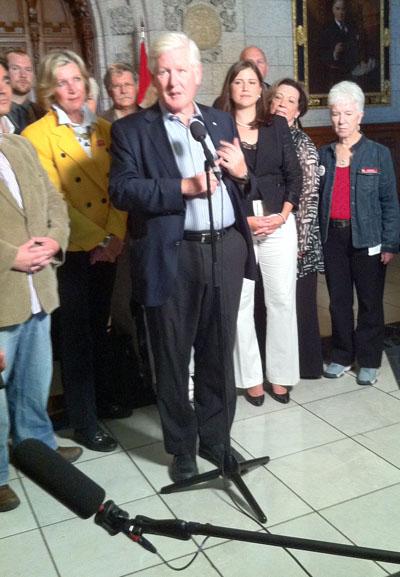At the Liberal caucus’s summer retreat in Ottawa, Bob Rae paid tribute to Jack Layton before moving on to stake out his party’s territory in the post-Layton parliamentary landscape.
“The first thing we have to do to win government in 2015 is be an effective alternative to Mr Harper, to run campaigns in 308 ridings, starting right now, to be prepared to do the work we need to do across the country,” Rae told the assembled group of current MPs, senators and defeated MPs and candidates. “But none of this will happen and none of this precludes a victory in 2015 unless we change the Liberal Party of Canada from its roots.”
After more than a day of frank assessments of their election losses, Rae was nevertheless optimistic about the party’s chances in four years.
“[People ask] what would make you believe for a moment that you have the remotest chance of winning in 2015?” Rae recounted. “And my answer is, quite simply, my own experience. I know what it takes to go from third, to second, to first, back from first to second, and third. I know what a three-party system is like.
“I’ve seen it through my political career. The biggest mistake that we can make is over-reading the election results of May 2.”
Rae’s speech was focused on the economy – particularly jobs and prosperity, words that have been absent from the Canadian political dialogue in recent memory.
“You’re going to hear a lot more of it from us,” says finance critic Scott Brison. “Our focus is building prosperity as a country and prosperity for all Canadians.”
“We need economic growth and prosperity to be able to sustain a just society, and there’s a real opportunity for a Liberal Party that has a very strong economic record and a history of social justice to marry the two important priorities of economic innovation and opportunity with social progress.”
Rae also repeated another mantra the party has been using in recent weeks – the need “to base policy on evidence, not on whim or prejudice or ideology.”
“When I talk to economists in Canada, they believe very strongly it’s important that the federal government recognize the potential impact of a possible recession in the US and Europe, and that the federal government have a plan,” Brison says as an example. “That’s dealing with reality. We want policies built around realistic thinking, facts and evidence – not pie-in-the-sky and not delusions and ideology.”
Rae’s message for party rebuilding was in large part about changing the party from a “family” model to that of a movement, including changes to the party’s constitution to address the fragmentation it faces.
“We have to make it a cleaner party and a leaner party,” says Alexandra Mendès, a defeated Quebec MP who is currently running for the job of party president. “We have to take down barriers to, not only receiving input from members, but from actually dialoguing with members.
“That is going to be a challenge, absolutely, but a very positive challenge, because it’s very doable. It’s something that is easily done. The technology is there, the knowledge is there and the willingness is there, so that also means changing the structures of the party,” Mendès says, adding that it is a job she is prepared to do if elected president.
The inclusion of so many defeated MPs and candidates at the meeting was a good move in Brison’s eyes.
“There’s a lot of wisdom in that room, and I was so impressed with some of the past candidates, including some of my former colleagues,” he says. “There are times in each of our lives where we learn more from defeat than victory.”
Looking forward to the fall session, Mendès sees the Liberal bench strength as the party’s greatest asset.
“We find ourselves being the most obvious opposition right now,” Mendès says. “If nothing else, for even with the very limited caucus of 34 members, the amalgamated number of years of experience in that caucus, starting with Mr Rae himself, is absolutely mind-boggling. These people have led provinces, have been ministers in government, have led municipalities, corporations.
“There is an enormous wealth of knowledge and competence in our caucus, which makes them the best place to absolutely be a coherent and effective opposition.”
Mendès hopes that the loss of Jack Layton will make Quebec voters take a look at just what the NDP platform actually says.
“They may question the capacity the party has to bring forth any concrete change,” she says. “First of all, they’re facing a majority government, and secondly, a lot of the things they’re proposing in their platform are matters of provincial jurisdiction, and they have absolutely nothing to do with the federal government, and others are matters that would create so much division in the country.”
“Maybe they’ll start wondering exactly what they voted for, and I hope that will mean they’ll start looking elsewhere.”


 Why you can trust Xtra
Why you can trust Xtra


